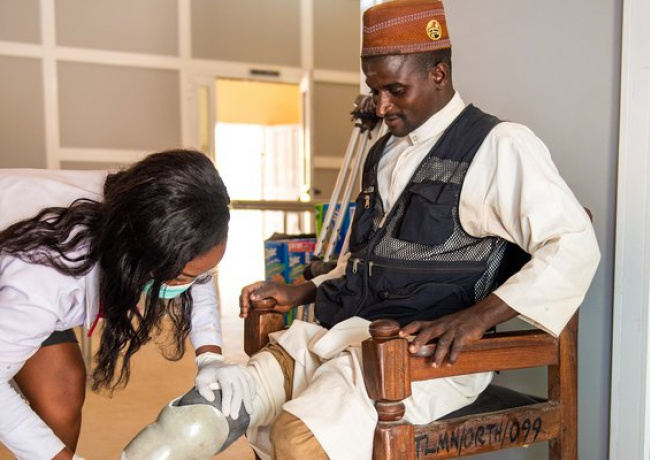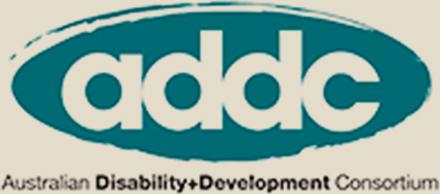Disability
What We Do
Our Disability Work
Leprosy is the leading cause of preventable disability in the world, and yet disability is not an inevitable consequence of leprosy. That’s why The Leprosy Mission is committed to seeing zero disability as a result of the disease.

Following the adoption of the United Nations Convention on the Rights of Persons with Disabilities (CRPD) , disability is increasingly understood as a human rights issue. It is also an important development issue because it often hinders access to basic provisions.

Our Approach
We are working with people living with disabilities, and with other non-governmental organisations (NGOs) to break down barriers, providing:
Specific, practical responses – such as providing specific activities like physiotherapy, occupational therapy, eye care and surgery.
Influencing, or ‘mainstreaming’ work - identifying and overcoming the barriers in society that people with leprosy and disabilities face, such as physical accessibility, communication, negative attitudes that lead to social exclusion, and discriminatory legislation.

Our disability-focused work includes:
Physical Rehabilitation
Physiotherapy, occupational therapy, surgery, and the provision of appliances like crutches, wheelchairs, and prostheses for people with mobility problems.
Livelihoods training and vocational training
Both in The Leprosy Mission’s own centres and by enabling disabled people to access livelihood programmes in their communities.
Community-based rehabilitation
Ensuring that people with disabilities are included in the development that is going on in communities
Training
Of people with disabilities to give them skills to break down barriers and stand up for their rights; and of governments and other organisations to ensure they include disabled people in their programmes.
Research
To understand the barriers that disabled people face and the things that facilitate their access to services, in partnership with people with disabilities themselves, as well as with universities around the world
Advocacy
At local, national, and global level, for the rights of people with disabilities. Our global advocacy includes joint action with our partners
Our Advocacy Partners:
International Disability and Development Consortium (IDDC)
International Disability Alliance
Disabled Peoples' International
International Federation of Anti-Leprosy Associations (ILEP)
Find out more about The Leprosy Mission’s international disability rights advocacy
Our Disability Projects

Nepal
No child should suffer leprosy
No child should suffer leprosy.Your urgent action now offers new life! Sometimes the suffering is just too much. What Satendra did to try to escape the suffering of leprosy is heartbreaking… Satendra was a boy. Just a boy.

Nepal
Nepal Education Program (SEED)
By making a donation to the Education Program in Nepal, you’ll be making a real difference — giving children affected by leprosy and disability the knowledge and skills they need for a better future.

Nigeria
Strengthening Integrated Neglected Tropical Disease Control in Zamfara
This project aims to increase access to quality leprosy, Lymphatic Filariasis (LF) and disability services within an integrated health system for communities in Zamfara, Nigeria. Working closely with the Nigerian Government’s Department of Health to improve health services for people with leprosy and LF, train health workers, and increase access to health clinics at a local level. The project works to integrate leprosy awareness and services into existing health services and communities in Zamfara through supporting the strengthening of general health services. This is done through improving facilities and services in public health centres and hospitals to improve leprosy treatment services. Additionally, the project works to increase services provided at public health centres, such as antenatal care, mental health services, counselling. As increased community members access these services, leprosy screening is routinely provided. Additionally, the project works within communities to improve general health through the provision of clean water in water poor communities, provide assistive devices (prosthetic limbs) and conduct leprosy awareness campaigns. Working towards more inclusive communities by breaking the stigma of leprosy is also a key focus of the project. Self-Help Groups involving people with leprosy and other disabilities are supported to develop stable livelihoods and increase their confidence to become active contributing members of their communities. People with leprosy are taught to advocate for their rights and the project provides support to change processes to ensure their rights are upheld (For example: in ensuring people with leprosy can vote in the national elections).

Nigeria
Strengthening Integrated Neglected Tropical Disease Control in Zamfara
This project aims to increase access to quality leprosy, Lymphatic Filariasis (LF) and disability services within an integrated health system for communities in Zamfara, Nigeria. Working closely with the Nigerian Government’s Department of Health to improve health services for people with leprosy and LF, train health workers, and increase access to health clinics at a local level. The project works to integrate leprosy awareness and services into existing health services and communities in Zamfara through supporting the strengthening of general health services. This is done through improving facilities and services in public health centres and hospitals to improve leprosy treatment services. Additionally, the project works to increase services provided at public health centres, such as antenatal care, mental health services, counselling. As increased community members access these services, leprosy screening is routinely provided. Additionally, the project works within communities to improve general health through the provision of clean water in water poor communities, provide assistive devices (prosthetic limbs) and conduct leprosy awareness campaigns. Working towards more inclusive communities by breaking the stigma of leprosy is also a key focus of the project. Self-Help Groups involving people with leprosy and other disabilities are supported to develop stable livelihoods and increase their confidence to become active contributing members of their communities. People with leprosy are taught to advocate for their rights and the project provides support to change processes to ensure their rights are upheld (For example: in ensuring people with leprosy can vote in the national elections).

Nigeria
Strengthening Integrated Neglected Tropical Disease Control in Zamfara
This project aims to increase access to quality leprosy, Lymphatic Filariasis (LF) and disability services within an integrated health system for communities in Zamfara, Nigeria. Working closely with the Nigerian Government’s Department of Health to improve health services for people with leprosy and LF, train health workers, and increase access to health clinics at a local level. The project works to integrate leprosy awareness and services into existing health services and communities in Zamfara through supporting the strengthening of general health services. This is done through improving facilities and services in public health centres and hospitals to improve leprosy treatment services. Additionally, the project works to increase services provided at public health centres, such as antenatal care, mental health services, counselling. As increased community members access these services, leprosy screening is routinely provided. Additionally, the project works within communities to improve general health through the provision of clean water in water poor communities, provide assistive devices (prosthetic limbs) and conduct leprosy awareness campaigns. Working towards more inclusive communities by breaking the stigma of leprosy is also a key focus of the project. Self-Help Groups involving people with leprosy and other disabilities are supported to develop stable livelihoods and increase their confidence to become active contributing members of their communities. People with leprosy are taught to advocate for their rights and the project provides support to change processes to ensure their rights are upheld (For example: in ensuring people with leprosy can vote in the national elections).

Nigeria
Strengthening Integrated Neglected Tropical Disease Control in Zamfara
This project aims to increase access to quality leprosy, Lymphatic Filariasis (LF) and disability services within an integrated health system for communities in Zamfara, Nigeria. Working closely with the Nigerian Government’s Department of Health to improve health services for people with leprosy and LF, train health workers, and increase access to health clinics at a local level. The project works to integrate leprosy awareness and services into existing health services and communities in Zamfara through supporting the strengthening of general health services. This is done through improving facilities and services in public health centres and hospitals to improve leprosy treatment services. Additionally, the project works to increase services provided at public health centres, such as antenatal care, mental health services, counselling. As increased community members access these services, leprosy screening is routinely provided. Additionally, the project works within communities to improve general health through the provision of clean water in water poor communities, provide assistive devices (prosthetic limbs) and conduct leprosy awareness campaigns. Working towards more inclusive communities by breaking the stigma of leprosy is also a key focus of the project. Self-Help Groups involving people with leprosy and other disabilities are supported to develop stable livelihoods and increase their confidence to become active contributing members of their communities. People with leprosy are taught to advocate for their rights and the project provides support to change processes to ensure their rights are upheld (For example: in ensuring people with leprosy can vote in the national elections).

Nigeria
Strengthening Integrated Neglected Tropical Disease Control in Zamfara
This project aims to increase access to quality leprosy, Lymphatic Filariasis (LF) and disability services within an integrated health system for communities in Zamfara, Nigeria. Working closely with the Nigerian Government’s Department of Health to improve health services for people with leprosy and LF, train health workers, and increase access to health clinics at a local level. The project works to integrate leprosy awareness and services into existing health services and communities in Zamfara through supporting the strengthening of general health services. This is done through improving facilities and services in public health centres and hospitals to improve leprosy treatment services. Additionally, the project works to increase services provided at public health centres, such as antenatal care, mental health services, counselling. As increased community members access these services, leprosy screening is routinely provided. Additionally, the project works within communities to improve general health through the provision of clean water in water poor communities, provide assistive devices (prosthetic limbs) and conduct leprosy awareness campaigns. Working towards more inclusive communities by breaking the stigma of leprosy is also a key focus of the project. Self-Help Groups involving people with leprosy and other disabilities are supported to develop stable livelihoods and increase their confidence to become active contributing members of their communities. People with leprosy are taught to advocate for their rights and the project provides support to change processes to ensure their rights are upheld (For example: in ensuring people with leprosy can vote in the national elections).

Nigeria
Strengthening Integrated Neglected Tropical Disease Control in Zamfara KIT1
This project aims to increase access to quality leprosy, Lymphatic Filariasis (LF) and disability services within an integrated health system for communities in Zamfara, Nigeria. Working closely with the Nigerian Government’s Department of Health to improve health services for people with leprosy and LF, train health workers, and increase access to health clinics at a local level. The project works to integrate leprosy awareness and services into existing health services and communities in Zamfara through supporting the strengthening of general health services. This is done through improving facilities and services in public health centres and hospitals to improve leprosy treatment services. Additionally, the project works to increase services provided at public health centres, such as antenatal care, mental health services, counselling. As increased community members access these services, leprosy screening is routinely provided. Additionally, the project works within communities to improve general health through the provision of clean water in water poor communities, provide assistive devices (prosthetic limbs) and conduct leprosy awareness campaigns. Working towards more inclusive communities by breaking the stigma of leprosy is also a key focus of the project. Self-Help Groups involving people with leprosy and other disabilities are supported to develop stable livelihoods and increase their confidence to become active contributing members of their communities. People with leprosy are taught to advocate for their rights and the project provides support to change processes to ensure their rights are upheld (For example: in ensuring people with leprosy can vote in the national elections).




